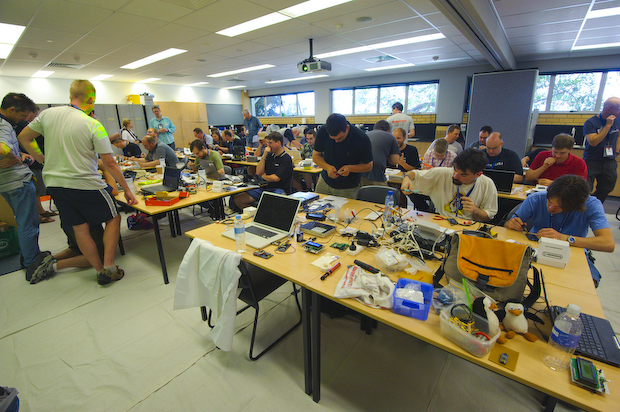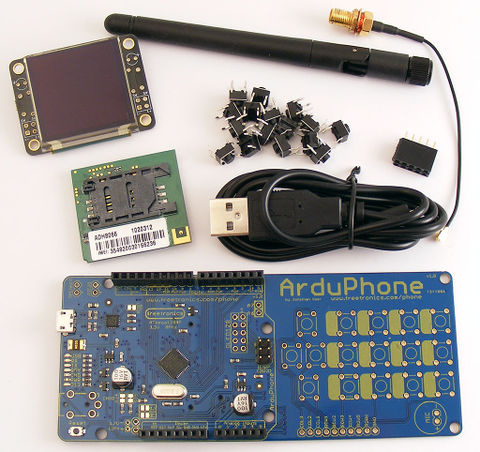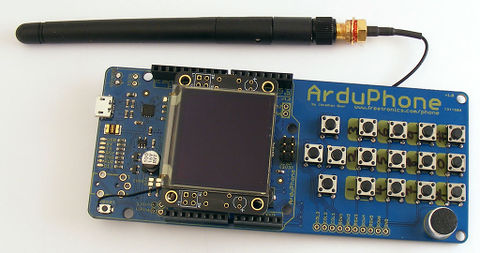Difference between revisions of "Main Page"
(→Where) |
(→Schedule) |
||
| Line 49: | Line 49: | ||
* 3:00 - 3:40 Afternoon Tea | * 3:00 - 3:40 Afternoon Tea | ||
* 3:40 - 4:00 Talk 5: Header versions: what does "R3" really mean? - Jonathan Oxer | * 3:40 - 4:00 Talk 5: Header versions: what does "R3" really mean? - Jonathan Oxer | ||
| − | * 4:00 - 4:20 Talk 6: | + | * 4:00 - 4:20 Talk 6: Getting PCBs (right) - Mitch Davis |
* 4:20 - 4:30 Break | * 4:20 - 4:30 Break | ||
* 4:30 - 4:50 Talk 7: Clockwork: reliable control for Fun and Work - Mike O'Connor | * 4:30 - 4:50 Talk 7: Clockwork: reliable control for Fun and Work - Mike O'Connor | ||
Revision as of 05:12, 7 January 2014
Contents
Registration
NOTE: All places have now been filled. However, you can still submit the registration form to be on the waiting list. More spots may become available.
Please register at Arduino Miniconf 2014 Registration Form
Email list
To stay in contact between conferences, the following Google Group email list has been set up. This will be good for technical support, letting each other know what we've done with our projects and preparation for the next Arduino Mini-Conference, LCA2014 in Perth.
Arduino Miniconf 2014
What
The Arduino Miniconf is a 1-day event that runs in conjunction with the linux.conf.au conference. It gives participants an opportunity to learn basic hardware skills such as soldering, by assembling their own Arduino-compatible project, and then the afternoon is filled with interesting talks about various projects and techniques related to Arduino and open hardware in general. To give you some idea what to expect, this is the hardware assembly session at the 2011 Arduino Miniconf:
(Photo by Andrew McMillan, CC2.0)
After the assembly session is over the room is cleaned up a bit and the talks begin. It's a fun and educational event!
When
Tuesday, January 7th, 2013, promptly after the LCA opening ceremony and morning tea. Please don't be late!
Where
Perth, as part of linux.conf.au.
The Miniconf room is in the Physics building, lab 1.28 on the first floor.
Here's a Google Maps link showing the entrance to the Physics building: https://mapsengine.google.com/map/edit?mid=zwnZQ4DudCOI.kVVmx0A1fTDY
Note that to attend you must first register for the main conference, which provides the venue. The Arduino Miniconf is part of LCA as a specialist stream for conference attendees: it's not a stand-alone event. See http://linux.conf.au/schedule/30084/view_talk?day=tuesday for more information.
Registration And Cost
Attendance is free (to linux.conf.au delegates) but if you wish to participate in the morning hardware assembly tutorial you will need to pre-register and purchase a kit for $110. Space is limited so get in fast! If you just want to come along and watch or attend the talks, you don't need to do anything. If you wish to participate in the hardware assembly tutorial, please submit the registration form:
Arduino Miniconf 2014 Registration Form
Schedule
- 10:40 - 11:25 ArduPhone workshop 1 (assembly)
- 11:25 - 11:35 Break
- 11:35 - 12:20 ArduPhone workshop 2 (assembly)
- 12:20 - 1:20 Lunch
- 1:20 - 1:45 Talk 1: ArduPhone hardware - Jonathan Oxer
- 1:45 - 2:10 Talk 2: ArduPhone software - Cary Dreelan
- 2:10 - 2:20 Break
- 2:20 - 2:40 Talk 3: Differences between Raspberry Pi and Arduino - Angus Gratton
- 2:40 - 3:00 Talk 4: node.js and Arduino - Justin Mclean
- 3:00 - 3:40 Afternoon Tea
- 3:40 - 4:00 Talk 5: Header versions: what does "R3" really mean? - Jonathan Oxer
- 4:00 - 4:20 Talk 6: Getting PCBs (right) - Mitch Davis
- 4:20 - 4:30 Break
- 4:30 - 4:50 Talk 7: Clockwork: reliable control for Fun and Work - Mike O'Connor
- 4:50 - 5:20 Lightning Talks (and project showcase)
- 5:20 Close
Hardware Assembly Project: ArduPhone
The hardware assembly project this year is designed to be easy for beginners to put together, even if they haven't soldered before, while still resulting in an amazingly cool end result. The ArduPhone design uses mostly surface mount parts which are all pre-fitted, leaving a small number of through-hole parts for you to solder on. You'll need to fit some connectors, solder in some buttons, and clip on some modules that contain most of the functionality pre-assembled and tested, so even if you're a total beginner to hardware hacking you'll end up with a working ArduPhone by the end of the miniconf.
An early prototype and unfitted parts:
Prototype with screen, GSM module, buttons, and antenna fitted:
For more information visit the ArduPhone page
Previous Arduino Miniconfs
For historical reference:
- Arduino Miniconf 2013 (Canberra, AU)
- Arduino Miniconf 2012 (Ballarat, AU)
- Arduino Miniconf 2011 (Brisbane, AU)
- Arduino Miniconf 2010 (Wellington, NZ)


